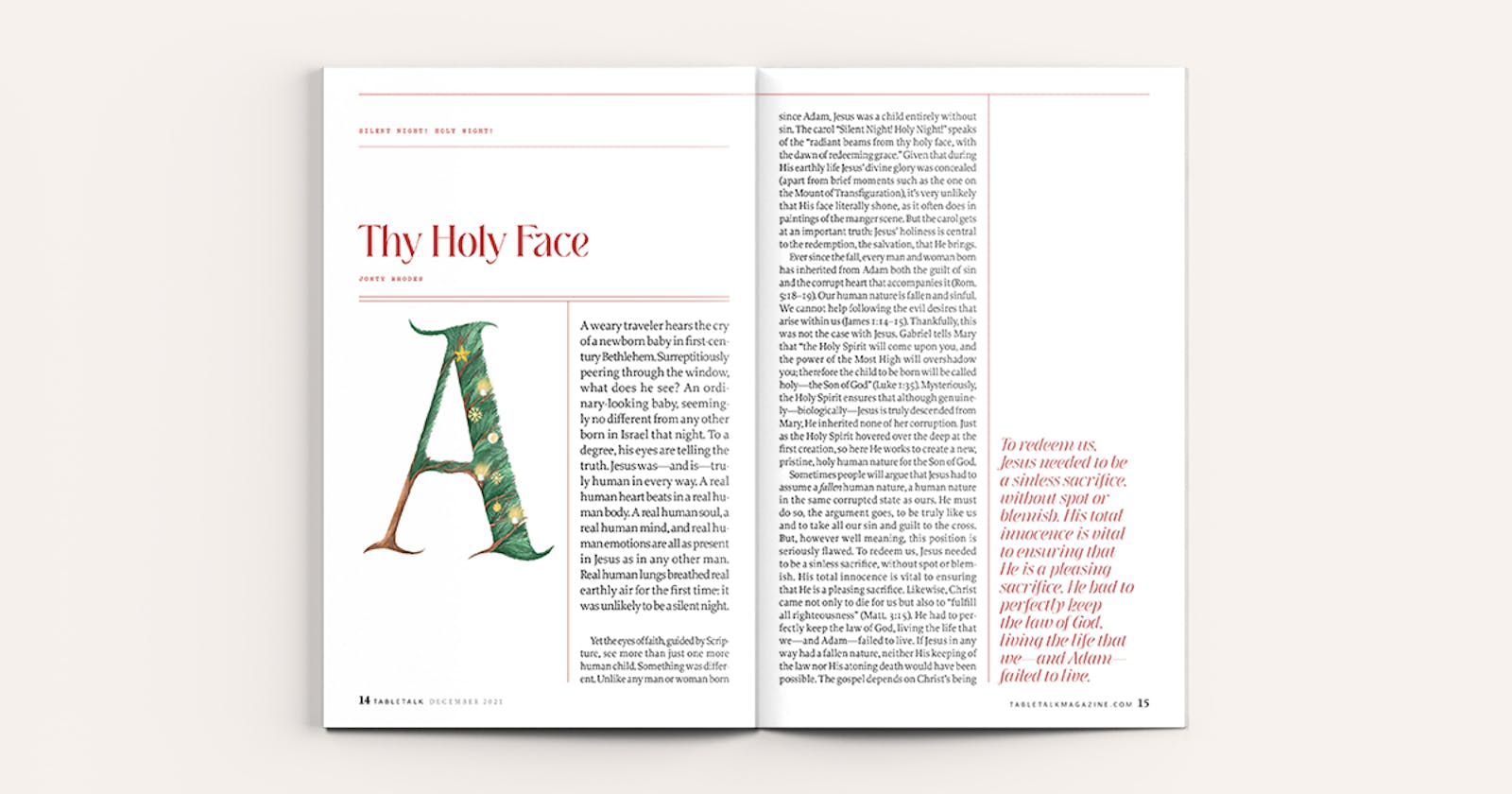
Request your free, three-month trial to Tabletalk magazine. You’ll receive the print issue monthly and gain immediate digital access to decades of archives. This trial is risk-free. No credit card required.
Try Tabletalk NowAlready receive Tabletalk magazine every month?
Verify your email address to gain unlimited access.
A weary traveler hears the cry of a newborn baby in first-century Bethlehem. Surreptitiously peering through the window, what does he see? An ordinary-looking baby, seemingly no different from any other born in Israel that night. To a degree, his eyes are telling the truth. Jesus was—and is—truly human in every way. A real human heart beats in a real human body. A real human soul, a real human mind, and real human emotions are all as present in Jesus as in any other man. Real human lungs breathed real earthly air for the first time: it was unlikely to be a silent night.
Yet the eyes of faith, guided by Scripture, see more than just one more human child. Something was different. Unlike any man or woman born since Adam, Jesus was a child entirely without sin. The carol “Silent Night! Holy Night!” speaks of the “radiant beams from thy holy face, with the dawn of redeeming grace.” Given that during His earthly life Jesus’ divine glory was concealed (apart from brief moments such as the one on the Mount of Transfiguration), it’s very unlikely that His face literally shone, as it often does in paintings of the manger scene. But the carol gets at an important truth: Jesus’ holiness is central to the redemption, the salvation, that He brings.
Ever since the fall, every man and woman born has inherited from Adam both the guilt of sin and the corrupt heart that accompanies it (Rom. 5:18–19). Our human nature is fallen and sinful. We cannot help following the evil desires that arise within us (James 1:14–15). Thankfully, this was not the case with Jesus. Gabriel tells Mary that “the Holy Spirit will come upon you, and the power of the Most High will overshadow you; therefore the child to be born will be called holy—the Son of God” (Luke 1:35). Mysteriously, the Holy Spirit ensures that although genuinely—biologically—Jesus is truly descended from Mary, He inherited none of her corruption. Just as the Holy Spirit hovered over the deep at the first creation, so here He works to create a new, pristine, holy human nature for the Son of God.
Sometimes people will argue that Jesus had to assume a fallen human nature, a human nature in the same corrupted state as ours. He must do so, the argument goes, to be truly like us and to take all our sin and guilt to the cross. But, however well meaning, this position is seriously flawed. To redeem us, Jesus needed to be a sinless sacrifice, without spot or blemish. His total innocence is vital to ensuring that He is a pleasing sacrifice. Likewise, Christ came not only to die for us but also to “fulfill all righteousness” (Matt. 3:15). He had to perfectly keep the law of God, living the life that we—and Adam—failed to live. If Jesus in any way had a fallen nature, neither His keeping of the law nor His atoning death would have been possible. The gospel depends on Christ’s being “the righteous for the unrighteous” (1 Peter 3:18). Our sin and guilt are “imputed,” counted as His, but He has no stain of His own.

So, yes, Jesus is truly human. But to be truly human, thank God, does not entail sin. Adam was made without sin. One day in the new heavens and earth, we will be truly human yet be entirely without sin. As the true image of God, Jesus was beautifully holy. He came “in the likeness of sinful flesh” (Rom. 8:3) but not in sinful flesh. He was like us in every way—except sin (Heb. 2:17).
His conception and birth thus began His work of salvation. At Bethlehem, redeeming grace dawned. Paul tells us that Christ came in “the fullness of time” (Gal. 4:4). It’s hard to say exactly why that moment was “at the right time” (Rom. 5:6). By the first century, God’s people had been dispersed around the Middle East and the Mediterranean. The conquest of Alexander the Great had given one language, Greek, to many different peoples. The conquest of Rome had made travel much easier. All these factors combined to help the gospel spread far more quickly than it might have spread a few centuries earlier or later. Whatever the reasons that that was just the right time, the good news of that first perhaps not-so-silent night was that the holy Son of God had become one of us in order to conquer sin, death, and the devil for our sake.
To redeem us, Jesus needed to be a sinless sacrifice, without spot or blemish. His total innocence is vital to ensuring that He is a pleasing sacrifice. He had to perfectly keep the law of God, living the life that we—and Adam—failed to live.
